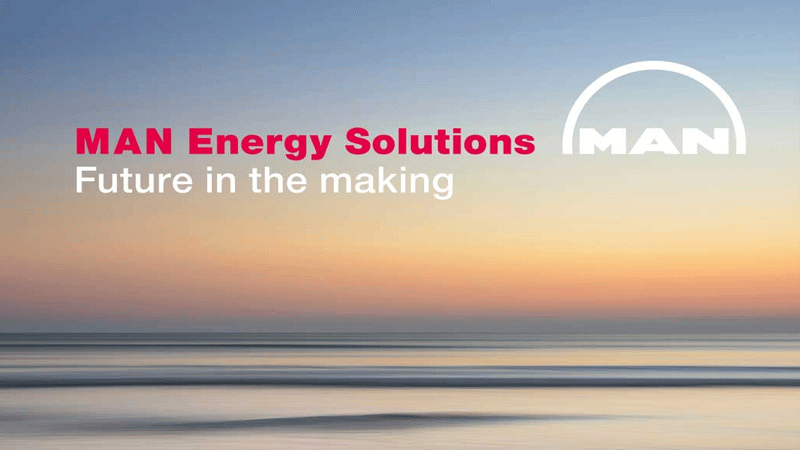MAN Energy Solutions has won an order for 6 × MAN B&W 11G95ME-GI Mk10.5 main engines in connection with the building of 6 × ultra-large, 23,500+-teu container vessels for Hapag-Lloyd, one of the world’s leading liner-shipping companies.
The engines will be built in Korea and will offer the option of operating on LNG or conventional fuel, meeting Tier III emission standards through SCR (Selective Catalytic Reduction). The first engine delivery is scheduled for May 2022. Korean shipyard, Daewoo Shipbuilding & Marine Engineering, will build the vessels with delivery expected from April through December 2023.
In the company’s own press release, Rolf Habben Jansen, CEO of Hapag-Lloyd said: “With the investment in six ultra large container vessels we will not only be able to reduce slot costs and improve our competitiveness on the Europe – Far East trade, but also take a significant step forward in modernizing our fleet. Additionally we will further reduce our environmental impact.”
The newbuildings will be deployed on the Europe – Far East routes as part of THE Alliance and will significantly increase Hapag-Lloyd´s competitiveness in this trade. The engines will operate on LNG, but have sufficient tank capacity to operate alternatively on conventional fuel.
Bjarne Foldager, Senior Vice President and Head of Two-Stroke Business at MAN Energy Solutions, said: “These newbuildings will be fitted with mature ME-GI technology that continues to accumulate references across multiple segments. The engines’ fuel-efficiency and negligible methane-slip tie in perfectly with Hapag-Lloyd’s strategy of sustainability. As we move towards a zero-carbon future, the ME-GI showcases our dual-fuel engine portfolio that is future-proofed to handle whatever alternative fuels come to prominence in the decades ahead.”
The new business follows a series of recent ME-GI sales with 5 × 6G70ME-GI Mk 10.5 dual-fuel engines ordered in October 2020 for 5 × Newcastlemax bulkcarriers for EPS, the Singapore-based shipping company. The previous month, Guangzhou Shipyard International Co., Ltd. (GSI) ordered 2 × 6G60ME-GI Mk 10.5 dual-fuel engines for 2 × LR2 tankers for Hafnia, one of the world’s leading, oil-product tanker owners and operators.
MAN Energy Solutions states that its low-speed, dual-fuel references now exceed 360 units, with the ME-GI recording over 1.5 million operating hours on LNG alone.
The ME-GI engine – the new industrial standard
MAN Energy Solutions successful ME-GI (-Gas Injection) engine has set a new industrial standard for two-stroke propulsion engines aboard – among others – container vessels, bulk carriers, tankers, LNG carriers and car carriers. The ME-GI engine provides ship-owners and operators with a peerless solution within environmentally friendly and high-efficiency, two-stroke technology, without the greenhouse emissions such as methane slip that are characteristic of competing engines.
With the ME-GI engine, two-stroke development has taken a step further by combining the unique properties of multi-fuel combustion and the well-known reliability of MAN Energy Solutions ME-engine. The Diesel principle not only provides the ME-GI engine with high operational stability and efficiency, but also ensures 100% stable and reliable operation during load changes on gas with just normal additions of pilot-oil amounts. Furthermore, the ME-GI operational principles features a seamless change-over between gas operation and diesel operation The ME-GI engine is the most environmentally friendly, technology available within the two-stroke engine segment.
MAN Energy Solutions has also developed an ME-LGI (-Liquid Gas Injection) dual-fuel engine that expands the company’s dual-fuel portfolio, enabling the use of more sustainable fuels such as methanol and liquefied petroleum gas (LPG).
The Maritime Energy Transition
MAN Energy Solutions believes that it is time for what it terms a ‘Maritime Energy Transition’ to find clean, decarbonised solutions for seaborne trade and transportation. Essentially, it is the company’s call to action to reduce emissions and establish natural gases as the fuels of choice in global shipping. It strongly promotes a global ‘turn to gas’, driven by the IMO, and a common approach by the shipping industry and politics to invest in infrastructure development and retrofits.









